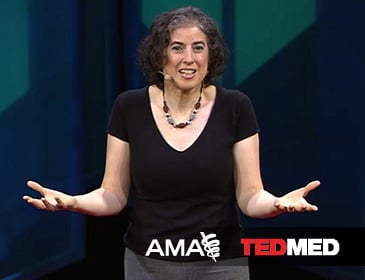As a resident or fellow, have you ever made a mistake—and kept quiet? One physician opened up about her experience as a medical trainee during TEDMED 2014, which took place earlier this month in San Francisco and Washington, D.C.
“I nearly killed a patient—and I never told a soul,” said Danielle Ofri, MD, PhD (pictured right), at the TEDMED 2014 event earlier this month. In her talk, Dr. Ofri—now a physician at Bellevue Hospital, professor at New York University School of Medicine and editor-in-chief of the Bellevue Literary Review—shared how she overlooked a patient’s intracranial bleed.
“It could have been a death,” Dr. Ofri said. “I was horrified at myself for not having done due diligence … in the end, this was a near-miss. But I had still made the error.”
The culture in Dr. Ofri’s residency wasn’t an open one. “The message we got was that anything short of perfection was failure,” she said.
And if the culture in an academic medical center is to remain tight-lipped about mistakes, that attitude will be instilled into residents. According to a 2014 survey of medical trainees published in Academic Medicine, most trainees had made or observed a harmful medical error, and role-modeling in the academic medical center has a strong effect on trainees’ attitudes and behaviors surrounding medical errors. For example, negative role models for responding to errors may impede trainees from disclosing them.
But the sheer number of decisions a physician must make every day—diagnosis, prognosis, treatment guidelines, medications, side effects and interactions, to name a few—means it’s nearly impossible to be perfect all the time, Dr. Ofri said.
“A certain percentage will always fall short—these are part of our native behavioral flora,” she said. “To think of them as foreign is to misunderstand the nature of error. If we can accept that errors are indigenous to the behavioral biome, then our goal is not some impossible expectation of sanitizing away all medical error, but rather to gather this collective ecology and shift it in our patients’ favor.”
The good news is that the culture is changing. Identifying medical errors and advocating for system improvements are part of the Accreditation Council for Graduate Medical Education’s core competencies for residents.
Beside oversight of academic medicine, individual physicians and residents can be more open and accepting that mistakes happen, and they can help determine processes to improve.
“If we hear from the titans of medicine that errors are a reality in medicine … we might be able to redefine our definition of perfection,” Dr. Ofri said. “Patients are ill-served by an impossible ideal of perfection that gives patients unrealistic expectations and keeps doctors and nurses from coming forward with errors because of shame.”
Watch Dr. Ofri give her talk at TEDMED 2014: Visit the TEDMED 2014 website and enter invitation code “TMLicAMA14.” Once you’ve logged in to the on-demand streaming, find the “Turn it upside down–D.C. Stage” video and go to 1:07:43 for the beginning of Dr. Ofri’s talk. View additional talks by other physicians, health care leaders and innovators through Oct. 10.
The AMA is a Global Institution Partner of TEDMED 2014, an association that makes this complimentary access to on-demand streaming possible.




